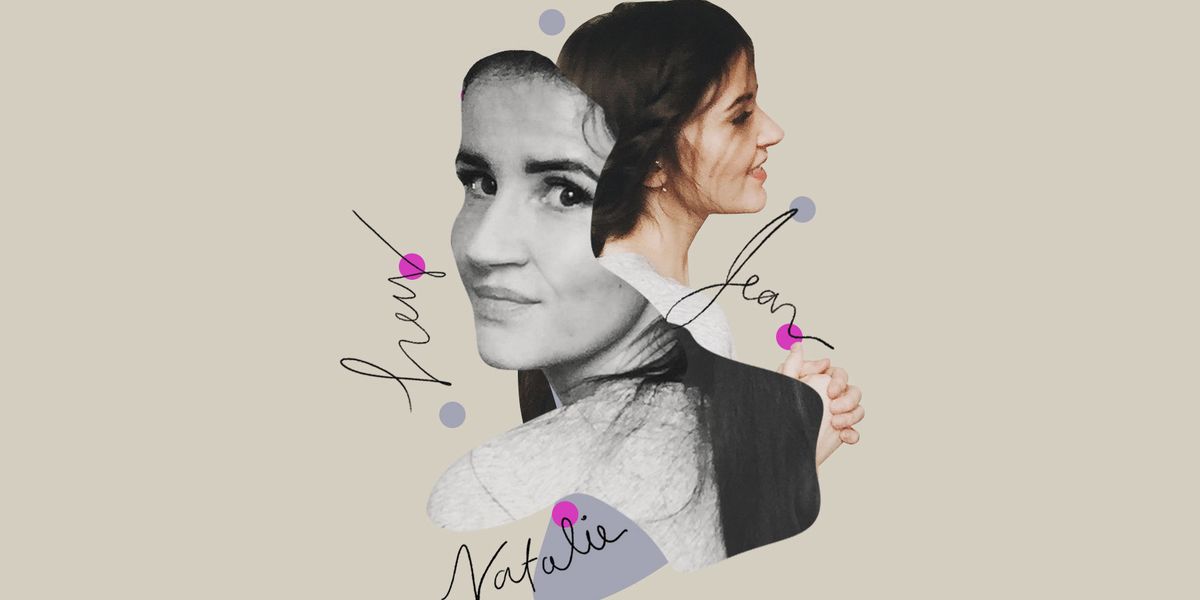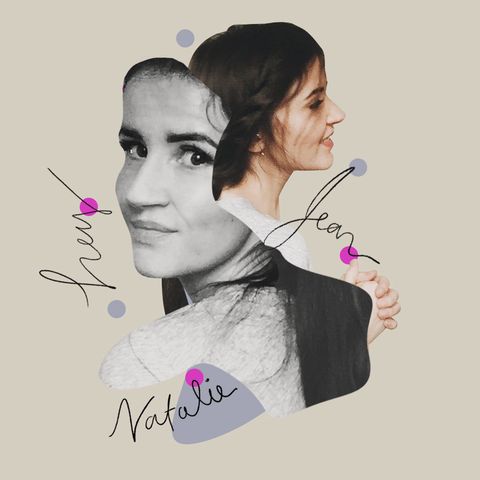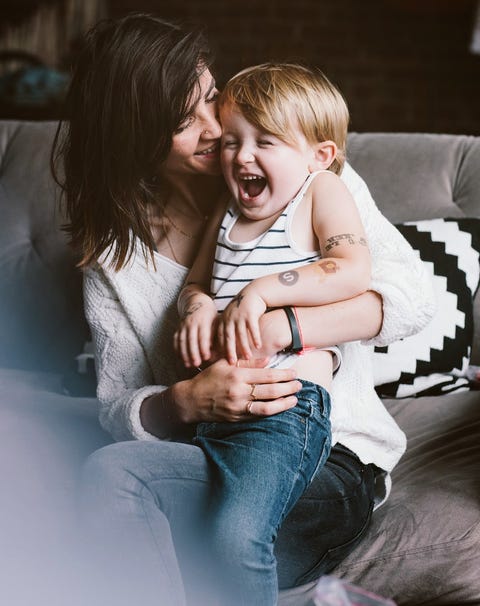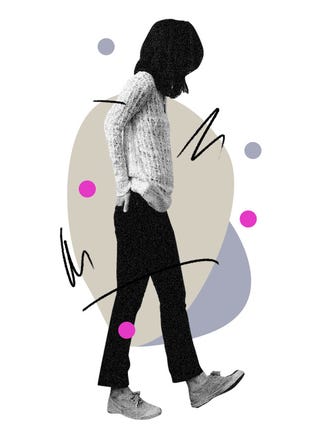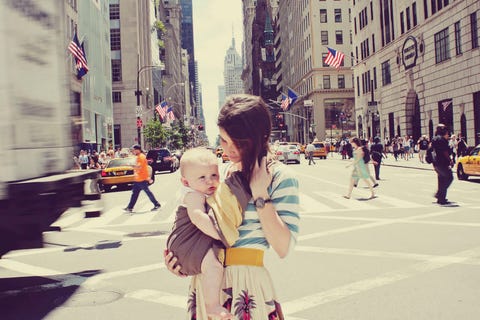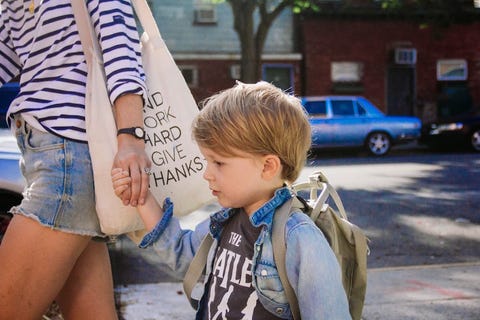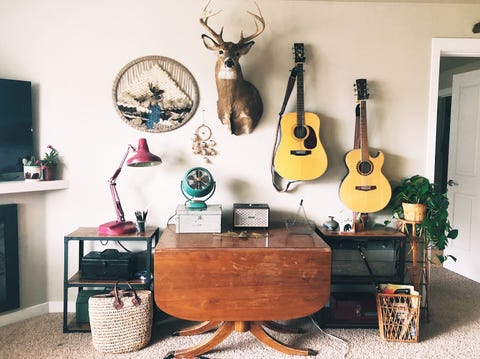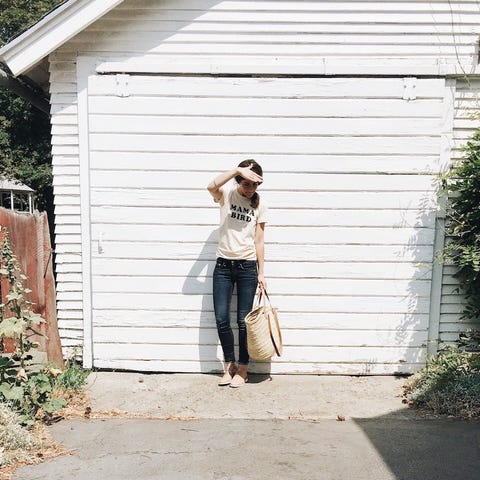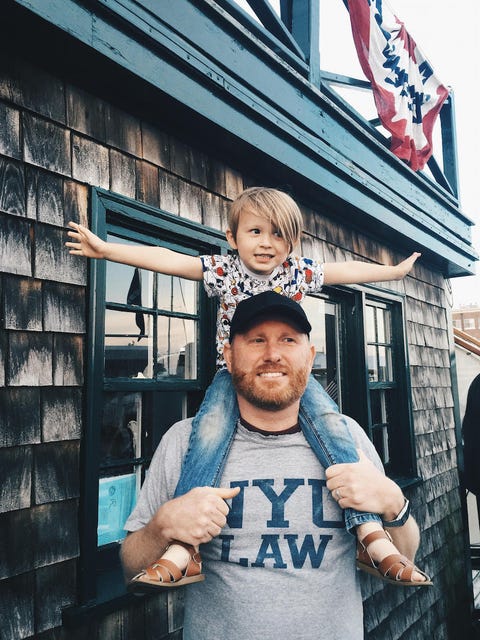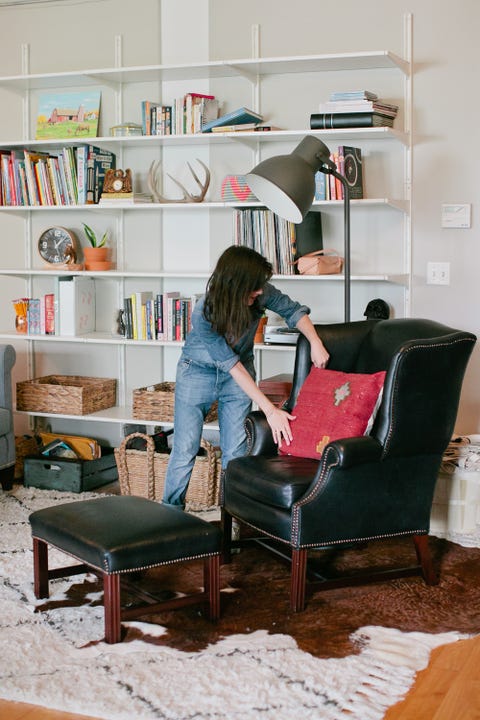Natalie Holbrook’s first Instagram post after her marriage ended was simple: three pink roses in a pitcher on a pale pine table. “When life gets crazy intense and stuff gets thrown all over everywhere,” the caption said, “pictures of flowers can help. I am hoping. Courage, knuckleheads!”
Natalie’s followers assumed the post was about the family’s upcoming move to a new house in their Idaho town, that the stuff being “thrown all over everywhere” referred to furniture and clothes. They imagined the kind of low-stakes chaos that befalls a stylish momfluencer who is sponsored by Pantene and regrammed by Martha Stewart, who has a cute husband and a cute son and, soon, another cute country house. “Literally the worst!” one commenter chirped, yet “aren’t we so blessed??”
In reality, the stuff thrown all over everywhere was Natalie’s marriage, Natalie’s future, Natalie’s very sense of self. Two days earlier, on April Fool’s Day, she’d moved to the new house by herself, in the rain, with a hastily rented U-Haul. She had just been dumped—her words—by her husband of more than a dozen years, the second man she’d ever kissed. They would later have vastly different ideas about how much alimony she needed, Natalie recalls. She had a college degree and experience working with household name brands. Couldn’t she just get a job?
She couldn’t. For the past ten years, Natalie’s job was being a lovably quirky wife and mother who documented her idyllic life online. It was tough to explain the long gap in her resume to potential employers. It was tougher to explain to herself, her loved ones, and her audience that the honeyed image she’d banked on had been an illusion for a long time.
“I had to reckon with the fact that I’d been lying to people,” Natalie (who now uses her maiden name, Lovin) tells me now. “I had to go back on my word and say ‘Just kidding, I was actually miserable, I just didn’t tell you.’” All those years curating and cropping her life, she says, “I was erasing evidence. I was erasing myself.”
Natalie and I are sitting in a Portland cafe, scrolling through her Instagram side-by-side. We’re trying to piece together the aftermath of her marriage and her blogging career, which ended within weeks of each other in the spring of 2016. I felt a pang of empathy for the gap between Natalie’s posts from that period and what Natalie now tells me was really going on. In an act of desperation three weeks before my own breakup with my husband, I posted a smug selfie of us snuggling on a beach towel. Things are always okay, until they’re not.
But for people like Natalie, who place an emotionally risky bet by monetizing their personal lives, divorce threatens to diminish the value of the carefully crafted narrative. Influencers are no less susceptible to divorce than the rest of us. Many of Natalie’s mommy blogging contemporaries have since split from their husbands, like Heather Armstrong of Dooce, Jill Smokler of Scary Mommy, and Maggie Mason of Mighty Girl. In each case, the breakup triggered some level of identity crisis: Who am I, really, and what do I do with this blog?
When I first interviewed Natalie Lovin in 2011, she was near the height of her powers. A 29-year-old stay-at-home mom, Natalie lived on New York City’s Upper West Side in a tiny but well appointed apartment with her breadwinner husband, known as “the Holbs,” and her pudgy baby, Huck. Her blog, Nat the Fat Rat, allowed her to make money off of housewifely bliss—a Phyllis Schlafly-esque hypocrisy that might have seemed unbearably retrograde, were it not for her love of Hillary Clinton’s pro-choice politics and Rachel Comey’s chic clogs. “[The Holbs] is growing his Christmas beard for me,” she wrote in December 2011. “Have I mentioned how that red beard makes my knees go all wobbly?” She had struggled for two years to get pregnant and, when Huck was born, she wrote, “Have you ever had a dream come true? This is what mine looks like.”
The family was proudly Mormon, though she didn’t often blog about it. Natalie struck me as poised and fulfilled; “Her life is one you want to have,” I wrote. Her 250,000 monthly readers seemed to agree.
Looking back, Natalie says, those were the “good years.” She genuinely relished being a mom, she was entranced by New York City, and she took great pleasure in making a home. Blogging provided a creative outlet and an engaged, supportive community. The Holbs was making good money as a financial services manager at a well-known accounting firm, and if she was getting free strollers for blogging about them—well, that was the icing on the cake. She wrote a book of advice, Hey Natalie Jean, that is a time capsule of the sunniest version of herself. “I lead a pretty charmed life,” starts a section called “How to Beat the Blahs.” “I know I’m really lucky. I walk around most days feeling really pretty great. Absurdly happy, even. It’s gross.”
As Natalie’s audience grew, the warm-and-fuzzy “mommy blogging” culture I’d written about gave way to sanitized influencer culture. At the behest of a talent agency, she changed her blog’s name to the less playful Hey Natalie Jean. The content became more photo-heavy and product-driven. She started partnering with brands like Nina Z and Tiffany & Co; she found herself at parties with Julia Stiles and Emily Ratajkowski. At her peak, she made $70,000 in a year and the site was attracting nearly 700,000 visitors a month. The blog cannibalized her life so much that nearly all her purchases were business expenses. A makeup run at Duane Reade? Write that off. Madewell? That, too. Michael’s? Amazon? “My apartment is my showroom,” she figured. Buying clothes and home goods felt like reinvesting in her career. The problem was, turning her blog into a career sucked the pleasure out of it. “The magic of it,” Natalie says, “was completely gone.”
By the time she was writing Hey Natalie Jean, in March 2015, it had been months since Natalie had been anything close to the absurdly happy woman the book described. She had become a fixture on GOMI, a site devoted to hate-reading personal blogs. A rift developed between her and another Mormon style blogger at her church, and the fallout felt like middle-school cafeteria politics all over again. She had never felt a deep connection to Mormonism, and she was increasingly appalled by its anti-LGBTQ doctrine. After she and the Holbs stopped going to church in the spring of 2014, she started wearing tank tops and getting tattoos and drinking. She lost a lot of weight, and felt wired and shaky, like “a scared mouse all of the time.” Every decision was overwhelming, and she had trouble sleeping.
Once outside the church, Natalie says, she could see the cracks in her marriage. Natalie and her husband had known they were polar opposites since they tied the knot in 2003 after meeting at BYU. At first their differences were refreshing, but as the years went on, they pried them apart. In New York, they found success, but not security. They were saddled with student debt, and everything was expensive. They fought about money and, according to Natalie, he talked about starting over in Utah, where his parents lived. They were both so busy, they were living on “separate islands.”
Natalie started to think that what she’d been raised to believe about marriage was sexist. She could see the Holbs was “fulfilling the role” he was taught and felt tremendous pressure to be a provider. She got the feeling he had cast her in an old-fashioned role too: as Adam’s rib, as a helpmate and cheerleader whose purpose is to support him and raise his kids. No wonder she loved being a mom, she realized. She was “finally in charge of something.”
Then the Holbs was offered a professorship that led the family back to Moscow, Idaho, where the couple had lived while he got his law degree at University of Idaho, before Huck was born. Suddenly Natalie was miles away from her beloved city, in a tiny, snowy Western town. She was having trouble getting pregnant again and had a miscarriage. She felt nuts from the Clomid she was taking to kickstart her ovulation. She scaled back her blog for the sake of her mental health and her marriage.
They were disappointed, exhausted, and fighting all the time. At times she thought her husband was being cruel, but the cruelty seemed wrapped up in their inherited notions of marriage. “He was treating me as an extension of himself,” she says. “So it didn’t seem inappropriate to be hard on me because I was a reflection of him.”
Natalie had been raised to stick it out, to make the best of a tough situation, but the day they were supposed to pick up the key to their new house, she says, the Holbs enumerated all the reasons they shouldn’t be together. (Natalie’s ex-husband declined to comment for this story.)So the next day Natalie rented a U-Haul, filled it with everything she could carry herself, and drove it a few minutes down the road to the new house she was supposed to be sharing with her family.
None of this pain made it into the announcement she posted in May 2016, that she was ending Hey Natalie Jean. “It’s time,” she wrote on Instagram. “It feels really good.” She left the post up for a few weeks, then shuttered the blog.
The trajectory of a divorce can be years-long and jagged, spikes of self-actualization followed by plunges of despair. In Natalie’s case, those extremes were made worse by a parallel loss of her career, the path of which was suddenly uncertain. Immediately after the breakup, she’d felt immense relief, but as the reality of her new life sank in, she wondered what she would do for work. Her follower count had plummeted since she’d shut down the blog; anyway, her routine in Moscow was not nearly as glamorous as her life in New York. “I remember being like, ‘That fucker,’” she recalls now. “‘Now that I need it, it’s not there anymore.’”
The low point came a full two years after they separated. She had moved from Moscow to Portland, Ore. for a job at a startup that evaporated within a few months. Unemployed and with no structure or routine, she could barely peel herself off the couch every day after driving her son to school. Worried that her estranged husband would cut off her cash flow, she hewed to a strict budget. But one day, sick of the depression, she took $16 of the Holbs’ money and signed up for a ballet class.
That’s where I first saw her, eight years after our last interview: standing at the barre in all black, a messy braid swept to the right side. It occurred to me that Natalie had probably done ballet as a child, and by inviting me she was presenting her new spin on a past life. Each of the dancers in the room—the teacher with tiger print pants, the man with dainty pink ballet slippers, the woman with two punky high buns and a holey T-shirt—seemed to be tapping into the recesses of their childhood training, and the discipline they’d retained, escaped, or recast as leisure.
Natalie kept coming back to ballet because it “was a place where I was allowed to be hard on myself and expect perfection of myself,” she explains after class over coffee. “I was lost, so it was nice to go somewhere and be like ‘This is my hour and a half to criticize myself like crazy, and then I have to stop afterwards.’”
Natalie lives in Wilsonville, a Portland suburb 40 minutes south of ballet class. Her apartment complex is filled with what she calls “in-betweeners:” people who have just moved or are looking to buy a house, people waiting for their lives to start. Her home has a distinct style: fusty and feminine, with nods to her childhood in Mesa, Arizona. The place is decorated with hanging guitars, cactii, a peacock rattan chair, a pale pink vintage quilt, as well as many of her own creations. She knitted the throw blanket on the couch, and has several baskets full of kerchiefs she embroidered with phrases like “#stillwithher.” Some still have $22 price tags on them, artifacts from the brief moment Natalie considered pursuing a career in crafting. She decided against it, she says, because “I didn’t want to ruin crafty stuff like I ruined writing.”
She’s not the only lifestyle blogger who feels this way. Capitalizing off one’s daily life, and what one loves in their life, is “an unsustainable business model,” says Heather Armstrong, the Dooce blogger who recently published a book about her own depression, The Valedictorian of Being Dead. “It’s completely demoralizing. The constant need to track and document what you’re doing for people—the burnout is real.”
When Armstrong realized she wanted to leave her husband, she immediately did calculations in her head. “I was like, if I destroy the narrative of the happy mommy blogger, that destroys the career,” she tells me over the phone. “Do I stay miserable inside of this marriage, or do I break free and figure out how to live the rest of my life?” She had moved into a giant house as a business investment—a backdrop for activities to document on her site, which was supporting her entire family. She agonized for six weeks, “in complete and utter panic,” before she asked for a separation. As with Natalie, the confluence of online vitriol and a difficult divorce plunged Armstrong into a deep depression.
Brand sponsors don’t care about your broken marriage, says Mae Karwowski, founder of influencer marketing company Obviously, as long as your followers stay with you. “We see brands being totally fine with divorce, or ‘My child might be autistic,’ or ‘We’re going to couples’ counseling.’” Meanwhile, influencer culture has been moving away from polished, aspirational lifestyle content in favor of the relatable candor that audiences now crave. As Eva Chen, Instagram’s director of fashion partnerships, told Tavi Gevinson: “People want to see you letting your hair down.”
But Natalie couldn’t bring herself to rebrand, and she couldn’t bring herself to blog through it. She did keep posting on Instagram, and former readers sensed something was up. “The Holbs” became “Huck’s dad.” We all noticed the five-year-old photos with bittersweet captions, a forearm clustered with fresh tattoos, a photo of her new home in Portland hashtagged #lifestylebloggerptsd. “I can tell something happened, I can tell you’re divorced,” people would email her. “I’m going through it too, and I’m lost, and I wish you would write about it.”
She never did. Natalie’s discomfort with packaging her life for consumption had become too much to bear. “I didn’t want to exist for other people,” she says. “I was still really aware of the fact that I didn’t even know what the story was.” Instead, she wrote in her journal—ugly, dark things she didn’t want anyone to know.
For a moment, in May 2018, it seemed as if blogger Natalie had been resurrected. She put her archives back online and announced her intent to start writing again. In a post titled “In Which I Live Behind the Target,” she alluded, in past tense, to the late stages of her marriage (“a complete shambles”) and the stress of maintaining her blog (“a kind of self-flagellating prison”). She described herself as “clinging to the final vestiges of expired dreams like a five-year-old clings to your leg at kindergarten drop off.” She seemed to be putting a determined spin on things, concluding with a plucky sign-off and a smiley face emoticon.
Then, on Instagram, I watched her posts grow less cryptic, more raw and more despairing. In one post, ostensibly about her sister’s cat dying, she wrote about her fruitless and never ending job search, about supporting “a man in his quest for a bread-winning job for 15 years, only to then miss out on the benefits therein because he dumps you.”
Gone was the gosh-dern-it, glass-half-full Natalie I’d met years ago, or even the resilient 35-year-old divorcee Natalie starting fresh with that blog post back in May. “There’s so much wrong here,” she wrote. “Life is so full of BS. It’s all a crapshoot.”
Natalie and her ex, she says, are both on “Team Huck.” Things between them are now cordial, even amicable. When I met Huck’s dad last spring, he was driving to Wilsonville from Pullman, WA, a town near Moscow, every other weekend, staying at Natalie’s parents’ house in Tualatin, not far from her apartment; he has since moved to Wilsonville. After ballet, we got in her beat-up, white Jeep Wrangler to swing by school and pick up Huck, now a matter-of-fact eight-year-old with decent manners and a penchant for flat soda. We brought him to his grandparents’, where the man formerly known as the Holbs was lounging in Natalie’s former bedroom.
“You’re in Portland on a sunny day,” he says, walking into the hallway to congratulate me.
“You got sunburned,” Natalie tells him.
“You know me,” he says. “Part cherry tomato.”
It’s not easy to picture Team Huck ensnared in a messy breakup. But over IPAs and finger foods the next day, Natalie brings me back to what she describes as “the dark place.”
After Natalie drove off in the rented U-Haul, her ex moved 10 miles away to Pullman, Washington. She stayed in Moscow in the tiny little house they were supposed to live in together. She bought a bunch of chickens, two ducks and a turkey named Ruth Bader Ginsburg. “I needed to establish my pecking order again,” she says. She cut her hair and got diagnosed with ADD; Natalie had heard Adderall works best when you sweat, so she started going to the gym. She had a temporary job at a real estate office and started selling those embroidered scarves and other crafts online to make ends meet. She and Huck’s dad were toying with getting back together, and in the midst of that wavering, Natalie read Betty Friedan’s 1963 classic, The Feminine Mystique.
“I wanted to make sure I knew what I was talking about,” she says. She’d always considered feminism—“not putting up with a man’s crap”—a part of her identity. But when she read Friedan, she realized she’d been putting up with men’s crap her whole life. If she was going to get back together with her husband, she was going to do it with “both eyes open.” After a road trip across the American West, they decided against reconciliation.
A year into the separation, she downloaded Tinder. “I was making up for lost time,” she says. She hooked up with students and travelers, anyone “with a pair of lips,” resolving to kiss one man for each year she was married. The first time she had sex with someone else, an adorable graduate student named who was studying the habitat of wolves and gave a little howl when he was happy, she was on her period. Blood was all over his face and the sheets. By the end, the place looked like a “murder scene.” Natalie had never had period sex before; she was “ripping off all sorts of Band-Aids.” It was exhilarating.
Eventually, in February 2018, she packed up and moved to Portland with her ex’s blessing and the startup gig. After that startup folded, she applied for and got rejected from countless jobs. Her strange resume confounded employers; she simultaneously appeared overqualified and underqualified. She looked like a successful blogger on paper but, without an aspirational domestic life to document, her earning potential was diminished.
Meanwhile, Natalie went back and forth with her ex’s attorney over alimony. For the time being, she still had access to Huck’s dad’s checking account, but she couldn’t shake her anxiety: This could be gone at any moment. I have to do something fast. “I don’t think he understood—and even I didn’t understand—what it takes to start over and build from nothing when you’ve been a stay-at-home mom,” she says. “That’s when I experienced for the first time how much it sucks to be a woman.”
In the past, she says, her idea of feminism was to be taken seriously and still have men to hold the door. Suddenly it was, “I need a job, and I have to explain to people the reason why I didn’t work for 10 years.”
Talking through these momentous changes, it’s easy to see why Natalie was such a successful lifestyle blogger. She’s a skilled storyteller who arranges folksy metaphors and quirky details like accent pillows. She knew that ballet class would telegraph poise, pain, and femininity to a journalist, and that I’d get a kick out of visiting the bedroom where she kissed a gentleman caller out the window as a teenager. Personal brands die hard.
After months of a contract gig writing Nike’s employee training materials, she finally secured a full-time job at the company this fall. (“It’s been the relief of MY LIFE,” she texted me after confirming the news.) Her divorce was officially finalized last summer, and her ex agreed to a modest alimony schedule that reduces over time. “I feel like a tarnished woman, like a brassy lady,” she tells me, in a good way. She dates very casually, but she’s not looking for a relationship, and certainly not a marriage. “The last thing I would want is someone relying on me to be something to them. I would much rather have no one to let down.” She very rarely posts on the blog, but she hopes she’ll one day feel the urge to write another book—the real story this time.
“I’ve been trying to piece myself back together by remembering who I was at different points,” Natalie says. “I’ve changed so much and so many times.”
A few hours after our coffee, Natalie posted an old video, from the “good years” on Instagram. It showed her and Huck traipsing around the city, with “Moon River” as the soundtrack. A visit from a “dear friend from New York”—me—had gotten her “all reflective.” She’d “lived so many lives,” she wrote, and sometimes “they seem to crash-converge into themselves to create one loooong story.” I noticed that she kept editing the caption, ever so slightly, cutting and adding words here and there. One version of the caption quoted the song’s lyrics: “Two drifters, my huckleberry friend.” The next minute, the reference was gone.
